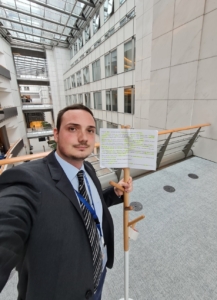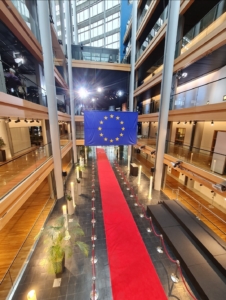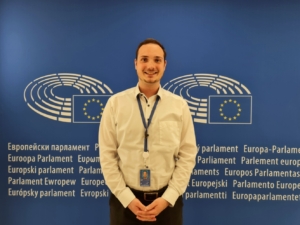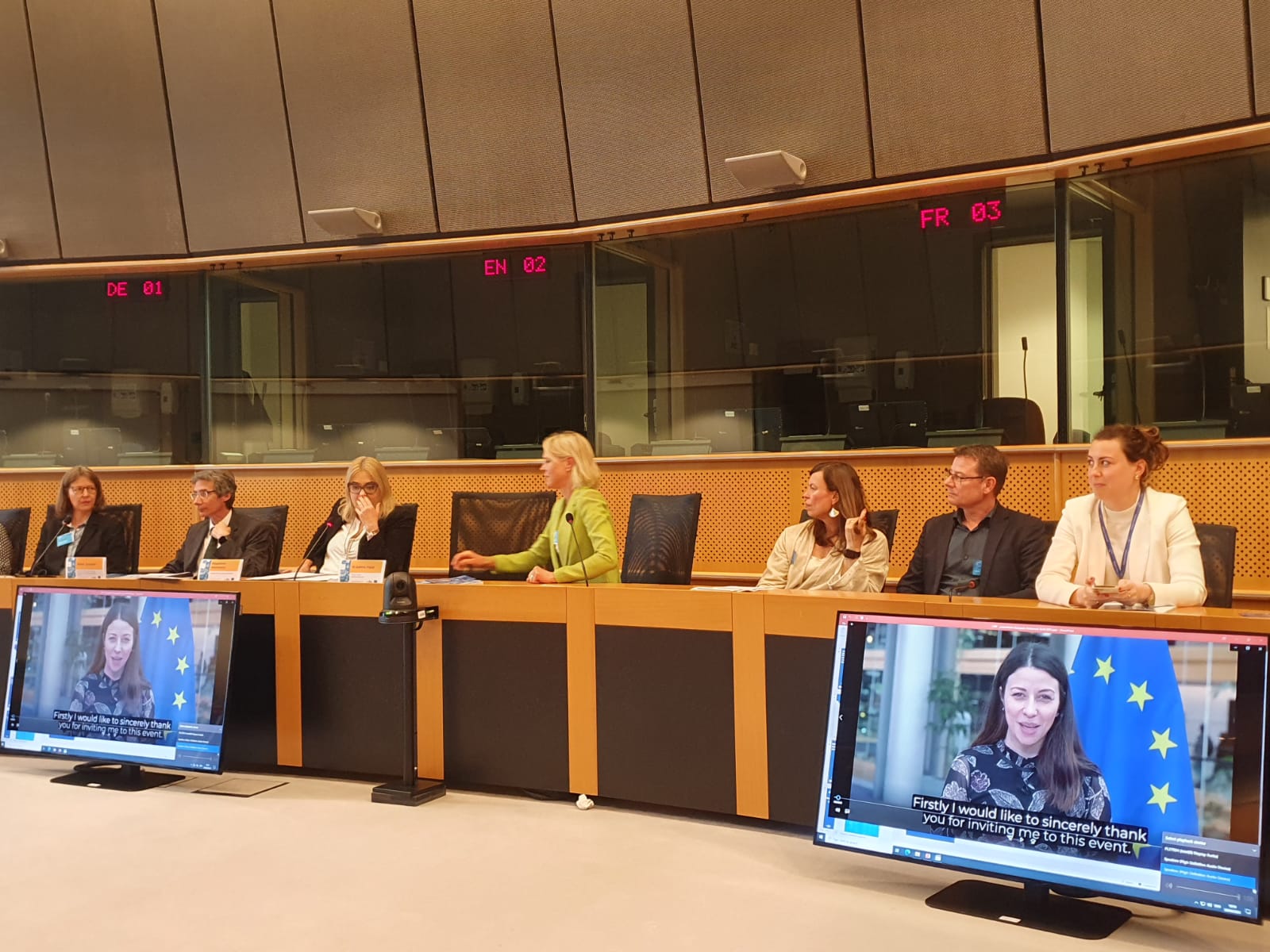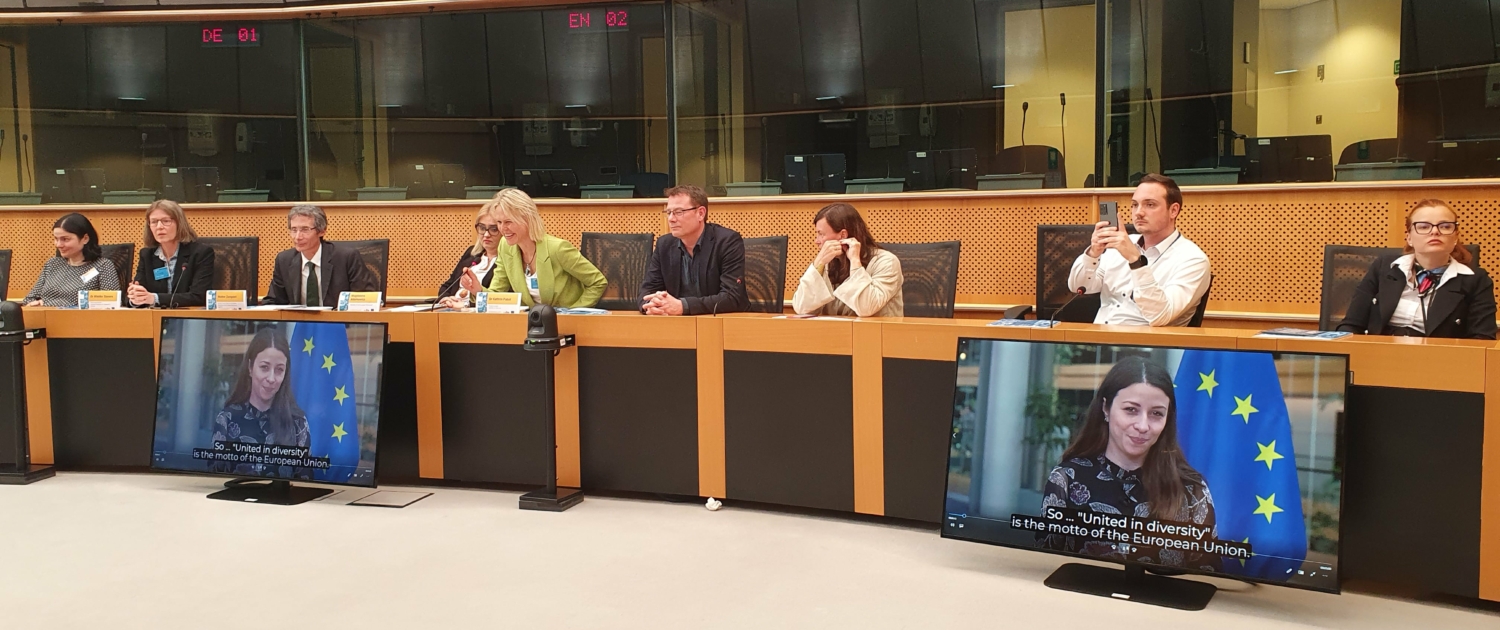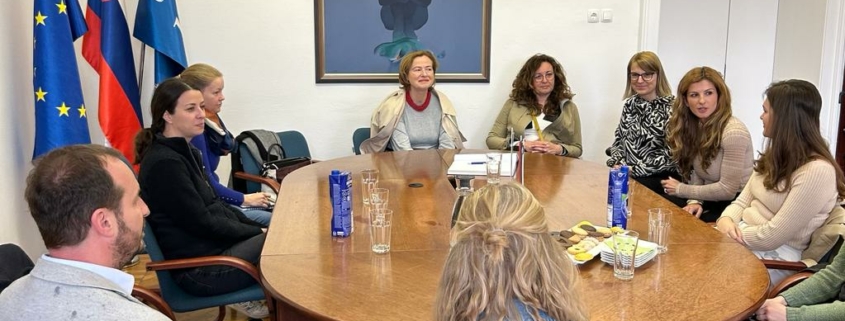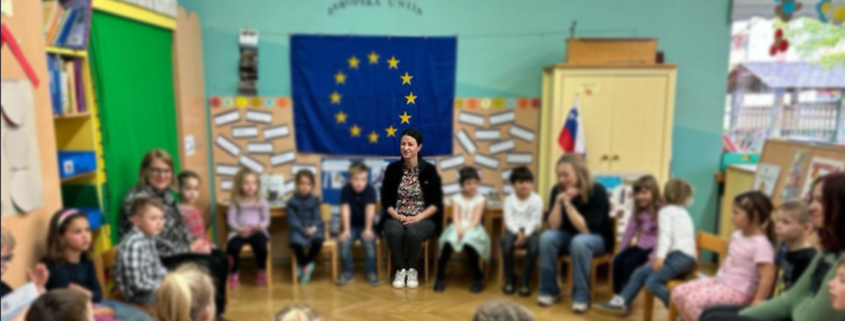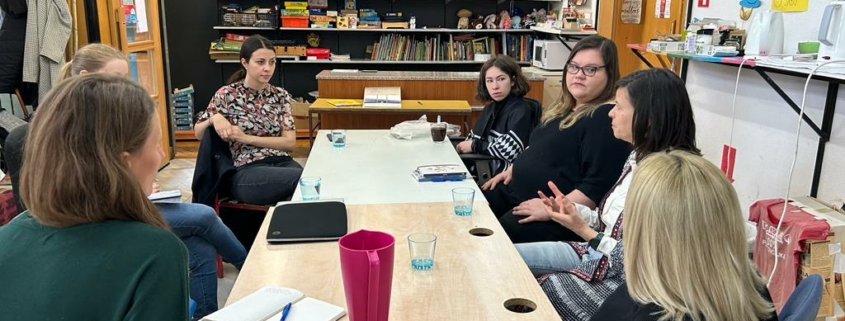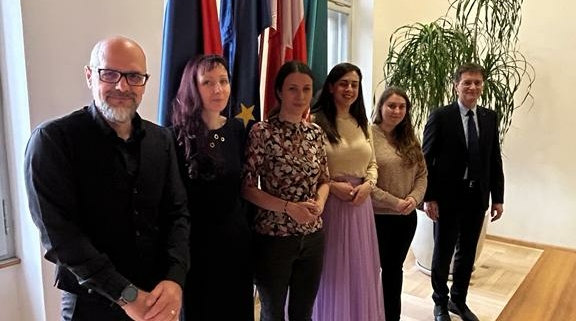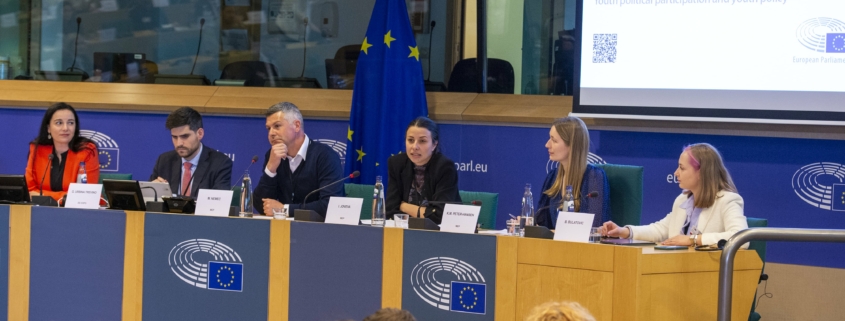When I received the news in the summer that I had been accepted for a traineeship in the office of MEP Irena Joveva, I was of course thrilled and eager for the opportunity. But as the weeks turned into days before I was due to leave, I felt a sense of uncertainty creeping in. With hindsight, it is quite funny when I think how needlessly scared I was. For my experience in Brussels was wonderful, as I will try to describe as fully and honestly as I can in the following lines.
The work of a trainee in the European Parliament is dynamic. I’ve attended various meetings and sessions and taken notes, helped organise events, recorded PR material for social media, written substantive texts and even assisted in the preparation of speeches. Irena’s team got me involved and I felt like I contributed and learned a lot at the same time. Despite the stereotype about traineeships, my tasks were by no means reduced to sitting in an office and making coffee. Ironically, though, without me there really would not have been any coffee, since it was me who brought a new coffee machine across town and into the office.
Sometimes the work was very relaxed, but at times it was also very tiring and hectic. For example, when I had to lead a group of more than 100 guests alone to a meeting room at the other end of the parliamentary complex. I really felt like a sheepdog, running up and down the corridor and directing the visitors through the parliamentary maze. Even so, I can proudly say that, despite the well-intentioned warnings of assistants and previous trainees, I never got lost in the two months and, in fact, found all the meeting rooms without a problem. The key is to quickly grasp the specific way the buildings, floors and rooms are marked.
The biggest misconception I had before coming to Brussels is that all MEPs are knowledgeable and intelligent, and that European politics is conducted at a higher level than national politics. Sadly, I had to face reality, as I attended several committees and events where I witnessed MEPs who were talking nonsense. I am not talking about disagreeing with them politically – there was plenty of that, and that is perfectly normal and healthy. I am talking about the fact that Members literally did not understand what the speakers before them were saying and were making grandiose statements that were, to put it mildly, embarrassing.
I have found it particularly interesting to follow the power relations and the relationships between the different players. Between the Parliament and the Commission, between the political groups, between MEPs from an individual Member State, between the MEPs within a given political group – all of whom have varying positions and interests that must ultimately be reconciled into a meaningful legislative proposal. It is precisely this multilayered nature of politics and the integration of multiple levels that interest me the most in my studies and in following politics; therefore, watching these processes has really soothed the political scientist in me.
Talking about reports and amendments is not an end in itself and not merely empty talk. I see the European Parliament as a platform where certain power structures and interest groups feel that they can express their views. Were these democratic institutions and power structures abolished, they would lose this sense of inclusiveness; these processes would not disappear, but rather only move elsewhere. This is how we get to unstable states where the processes migrate from meeting rooms to the streets and the battlefields (see Sudan), or authoritarian regimes where decision-making is concentrated in the hands of a corrupt ruling clique. I consider it all the more important that such a forum exists at the European level, as it has a significant impact on the region’s synergy. I feel it is important to emphasise this wider value of the European Parliament, which I was aware of before, but was only really able to experience during my traineeship.
The rest of my account will have a more relaxed tone. I spent my free time in an active manner, swimming a lot at the local pool. On weekends, I had more than enough time to see all the sights in Brussels. I climbed to the top of the City Hall tower, visited the Atomium, saw Manneken Pis in four different attires and much more… I find Brussels a very pleasant city and nicer than Strasbourg. I have learnt that not many would agree, but my opinion remains unchanged. I like the vibe of Brussels, I like its cobbled streets lined with old townhouses and trees. I enjoyed every walk and bike trip.
It goes without saying that I also went to see the headquarters of the other European institutions up close. The Berlaymont, Justus Lipsius and Europa are impressive buildings that are sure to leave you in awe. If you register early enough, you can even get a free place on a guided tour of the European Council headquarters. I also went on a few trips to other Belgian cities. To Ghent, where I was impressed by the city centre, beautifully connected to the river, to Antwerp, the diamond capital of the world, and to Leuven, a historic university town. I discovered how great it is to travel by train, even more so during the weekend when tickets are half-price.
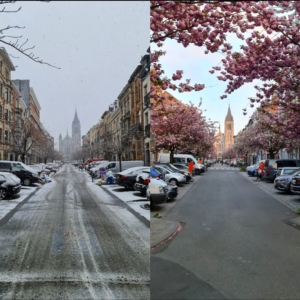 I also very much liked the Brussels weather, as I don’t mind a rainy or a cloudy day. It even snowed on 8 March! But towards the end of my traineeship, it was already sunny and warm. I have thus been lucky to experience both sides of Brussels. Just as I was lucky to experience both sides of the work of MEP Irena Joveva. For the majority of my time in her office, I could follow her work in Brussels. But since I went home during the Easter holidays, I also had the opportunity to gain an insight into the so-called Green Week, which is when MEPs work in their local constituency. I accompanied Irena to an event and was thus able to experience parliamentary work in Brussels, Ljubljana and Brussels again in a single week.
I also very much liked the Brussels weather, as I don’t mind a rainy or a cloudy day. It even snowed on 8 March! But towards the end of my traineeship, it was already sunny and warm. I have thus been lucky to experience both sides of Brussels. Just as I was lucky to experience both sides of the work of MEP Irena Joveva. For the majority of my time in her office, I could follow her work in Brussels. But since I went home during the Easter holidays, I also had the opportunity to gain an insight into the so-called Green Week, which is when MEPs work in their local constituency. I accompanied Irena to an event and was thus able to experience parliamentary work in Brussels, Ljubljana and Brussels again in a single week.
Unfortunately, the downside of Brussels is food. I think we are lucky in Slovenia in the sense that we are influenced by the Italian, Germanic and Balkan cuisines, which, at least to my taste, are much nicer than the French and Belgian cuisines. I had an interesting thought flashing in my mind when I was passing by the tables in the Parliament’s canteen and hearing so many different languages. I imagined the dining room of a spaceship, with several species of creatures onboard, working and exploring space together. I thought of the European Union’s slogan ‘United in Diversity’ and was genuinely moved. In the shops, where I usually met a random crowd, I saw people from all around the world. Perhaps some people would mind that, given that Slovenians are not used to such immense diversity, but I liked it, because it helped me not to feel like a stranger.
As I am moving to my conclusion, I would like to pass on a piece of advice to future trainees. Pay close attention and read your emails! You will receive a mass of invitations to events and other messages that are not relevant to the day-to-day work of a trainee. You can easily miss a really important email. For example, from the Parliament’s transport service, which leaves you without a seat on the charter train to Strasbourg…
The biggest difficulty I have had in writing this blog is to provide a complete description of these two months, during which I have experienced so many different things, thoughts and feelings. I have tried to be brief and to highlight the really essential things. But to sum up, it was definitely an experience worth having. I was exposed to completely new situations and as a result gained an excellent grounding in the job, the work environment, interaction with colleagues, functioning of the European institutions and the behind-the-scenes of politics. In addition, I gained life experience, as I learnt how to navigate the obstacles of leading an independent life. Going to a foreign country for two months, to an unfamiliar city, and meeting so many new people is undoubtedly a challenge. But after a week or two I had settled in and realised what I needed to do, and this is when I started to enjoy the experience. I now feel very at home in Brussels and it will be difficult to leave. But I am definitely glad, because I am leaving with a feeling of fulfilment and satisfaction. And because now I know that I can go abroad and work in such an important international institution as the European Parliament.
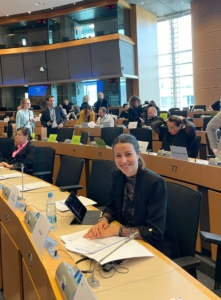 I would like to conclude this blog with some words of thanks. Thank you to the assistant and mentor Elma for accompanying, guiding and helping me throughout my traineeship. I could always rely on her and for that I am truly grateful. Thank you to assistants Žana and Rok for their help and patience, especially during my first plenary session in Strasbourg. Thank you also to the local assistants Tilen and Jasna who invited me to the office in Ljubljana and offered me advice even before the official start of my traineeship in Brussels. Thank you to the other Slovenian trainees from the SPC (Slovenian Pastoral Centre Brussels) for sharing so much useful information. And last but not least, thank you to MEP Irena. Her public image reflects that she is a cool and friendly person, but still she pleasantly surprised me with her good humour and humanity, which made my traineeship even better and more rewarding, as I felt that I was working for the right person. Thank you all.
I would like to conclude this blog with some words of thanks. Thank you to the assistant and mentor Elma for accompanying, guiding and helping me throughout my traineeship. I could always rely on her and for that I am truly grateful. Thank you to assistants Žana and Rok for their help and patience, especially during my first plenary session in Strasbourg. Thank you also to the local assistants Tilen and Jasna who invited me to the office in Ljubljana and offered me advice even before the official start of my traineeship in Brussels. Thank you to the other Slovenian trainees from the SPC (Slovenian Pastoral Centre Brussels) for sharing so much useful information. And last but not least, thank you to MEP Irena. Her public image reflects that she is a cool and friendly person, but still she pleasantly surprised me with her good humour and humanity, which made my traineeship even better and more rewarding, as I felt that I was working for the right person. Thank you all.
Jakob Grbac

